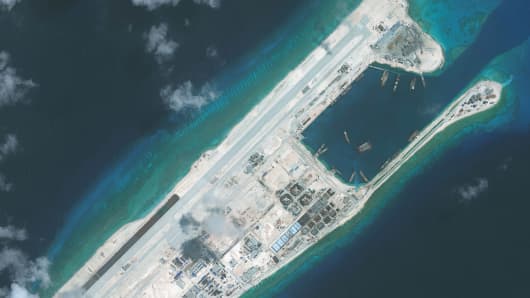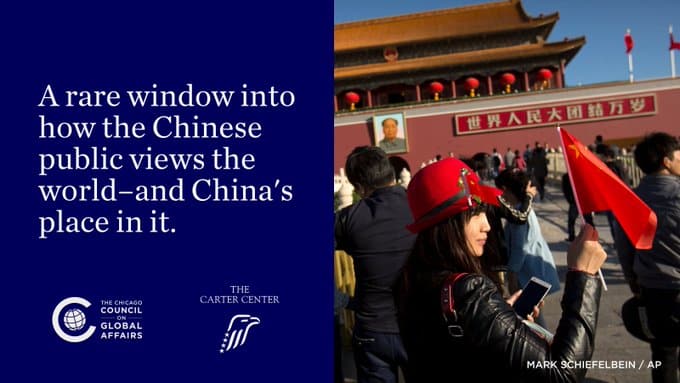China says it’s ready if US ‘stirs up any conflict’ in South China Sea
BEIJING — China‘s attempts to claim a nearly 1.4-million-square-mile swathe of open ocean are without precedent and probably without legal merit, but Beijing continues to assert its right to the economically critical zone — and increasingly puts its claims in military terms.
Speaking to a small group of reporters in Beijing on Thursday, a high-ranking Chinese official made his warning clear: The United States should not provoke China in the South China Sea without expecting retaliation.
“The Chinese people do not want to have war, so we will be opposed to [the] U.S. if it stirs up any conflict,” said Liu Zhenmin, vice minister of the Ministry of Foreign Affairs. “Of course, if the Korean War or Vietnam War are replayed, then we will have to defend ourselves.”
The so-called “nine-dash line” that China has drawn over most of the South China Sea — a gargantuan territorial claim that stretches about 1,200 miles from its shores — would give Beijing control over a zone that’s estimated to handle about half of global merchant shipping, a third of the planet’s oil shipping, two-thirds of global liquid natural gas shipments, and more than a 10th of Earth’s fish catch. The Obama administration, backed by several Asian governments and entities such as the Brookings Institution, argues that such massive ocean claims at great distance from land are “inconsistent with international law.”
China has a growing military presence in the region, including the wholesale raising of islands and construction of airfields on what were once atolls. The U.S. Navy operates there as well, increasingly in concert with regional powers such as the Philippines. Two Chinese fighter jets on Tuesday intercepted and passed within 50 feet of a U.S. military reconnaissance plane.
“We rely heavily on the South China Sea [for] transportation of resources and energy and the South China Sea is an important trading group for us. We attach great importance to peace and stability in the South China Sea,” said Liu, who warned the United States that it “cannot circle China by building military bases — we cannot do so 30 years ago, or even now.”
“Chinese people and the government feel like we haven’t been treated fairly because the U.S. is blaming China for rising tensions in the South China Sea,” said Liu, who added that “what matters is that the U.S. government has recognized that times have changed, [and the U.S.] can gain much more through cooperation than going to war.”
China is party to the U.N. Convention on the Law of the Sea, and that framework provides “no legal basis” for China to claim its “nine-dash” area, said Alessio Patalano, senior lecturer in Naval History and East Asian Security at King’s College London.
But beyond that, Patalano said, China’s actions have no historical precedent.
“There is not a precedent of this kind, and this is for two reasons,” Patalano told CNBC. “First until recently, technology didn’t allow nation states to project power over the oceans as it is possible today. Second, today’s degree of interdependence has no precedent in history, therefore issues over the ability of shipping to move through this basin has potential impact on the international system in a way that was not possible previously.”
The South China Sea for years has been a point of contention for bordering nations besides China, including Vietnam, Malaysia and the Philippines, but in recent years has become a larger nexus of disagreement as China has unilaterally declared the region its own. China’s fishing fleet, the world’s biggest, operates increasingly within the legally exclusive zones of Vietnam, Indonesia, Thailand and other countries.
A tribunal at the Permanent Court of Arbitration in The Hague is expected to rule in the next couple months on China’s expansive territorial claims, though China has already rejected those proceedings.
As the dispute festers, experts see a higher chance of an unintended conflict between U.S. and Chinese vessels or aircraft, something that was witnessed in 2001 when a Chinese and a U.S. plane collided. China watchers say if a collision were to happen in 2016, a strong response from both sides could be possible.
“China attaches far greater importance to peace in the South China Sea — much greater than the U.S. and Japan. No one should doubt our sincerity in this subject,” Liu said. “The Chinese government will uphold peace in Southeast Asia even for the sake of our own survival. In this sense we are actively against any moves that will jeopardize peace in the South China Sea.”
Liu warned that a conflict between China and the United States would have wide repercussions for the global economy.
“No country would want to see confrontations between [the] U.S. and China,” he said, “because [the] Chinese and U.S. economy will be hurt, and impacts will be felt across the world.”
By Seema Moody and Ted Kemp, CNBC









